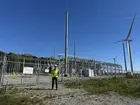
Recruiting Journeys | Energy: Hackett Landefeld ’24, RWE
After almost a decade in the U.S. Army, Hackett Landefeld ’24 used his time at SOM to pivot into a new role in clean energy development.
In this series, recent Yale SOM graduates break down the recruiting process that led them to their current roles.
How does the recruiting process work in your field?
My background is as a U.S. Army engineer officer, and although I had spent years leading people and projects, I didn’t have any direct experience in the renewable energy space. But I talked to several SOM grads and military veterans who had gone into the field and it seemed both fascinating as an emerging industry and relevant to my experience as a veteran. So when I arrived at SOM, I got involved in the Energy Club. While the energy recruiting pathway isn’t as structured as those for consulting or investment banking, the club has an energy recruiting working group that meets every week. Members share the opportunities they see, and share where they are in the recruiting journeys—“I applied to a job and reached out to this person,” or “I have an interview this week, and this is how I’m prepping for it.” It’s a great accountability measure. The club also hosts useful events where employers talk about their recruitment processes and their broader perspectives on the field.
By connecting with a Class of 2022 graduate, I managed to land a summer internship at D.E. Shaw Renewable Investments in a super competitive application process. Also during my first year, I attended the Yale Clean Energy Conference and connected with a Class of 2017 alum who worked at RWE. He and I stayed in touch, and when I was looking for a full-time job, he told me he was expanding his team and helped me get an interview. By that point, I’d gained a lot of knowledge through the Energy Club, the Yale curriculum, the events hosted by SOM and the Yale Center for Business and the Environment (CBEY), and my internship, all of which helped me talk intelligently about the industry and gave me an edge in the interview process.
Which SOM classes prepared you best for your current role?
One really popular course that helped me a lot is Renewable Energy Project Finance. It’s taught by Dan Gross ’93, who is the director of the Amazon Climate Pledge Fund. It’s a really comprehensive course on the renewable energy industry, particularly on the subject of power generation, and it teaches you to model some of the most common financial structures used in the energy space. You build practical knowledge and skills every day and in every single homework assignment. I’ve even gone back to those homework assignments and redone them, just to understand the material better. Financing Green Technologies, taught by Richard Kauffman ’83, also gave me a broader understanding of how investors can take clean energy technology from early-stage development to broad commercial application.
Which SOM resources helped you most during the recruiting process?
The CDO helped me build and refine my résumé, and gave me cover letter advice when I was completing applications. Deborah Shea, one of the career coaches with the CDO, was especially helpful with interview prep for my internship and my current job. The CDO can also help students strategize about networking and decide which companies to target. I could say, “Hey, I’m interested in this particular sector and these functions,” and the CDO can tell me, “These are some companies with job openings where we’ve seen SOM graduates go to work.”
For the energy sector in particular, the broader Yale network is also really useful—especially the School of the Environment, which is right across the street. I took several classes that were composed of both SOM and YSE students. CBEY also hosts a lot of events and programs that connect SOM students to the university community. I found that being able to network and share knowledge with students from different parts of Yale was a great way to gain a broader perspective on the energy industry.
What advice would you give current students who are recruiting for energy roles?
What really worked for me was taking networking seriously and building relationships with people I found through SOM. There’s a saying that if you ask for a job, you might get advice—but if you ask for advice, you might get a job. Long-term networking is what got me my current job as a utility-scale renewables developer at a global energy firm.
If you come to SOM and want to work in the energy space, think of recruiting as a marathon, not a sprint. In your first fall, start thinking about the relationships you can build. When you find people you can learn from, bring them to SOM to share their knowledge with other students. Those relationships can really pay off down the road.
Learn about the Yale SOM Energy Club and visit our sustainability information hub.



